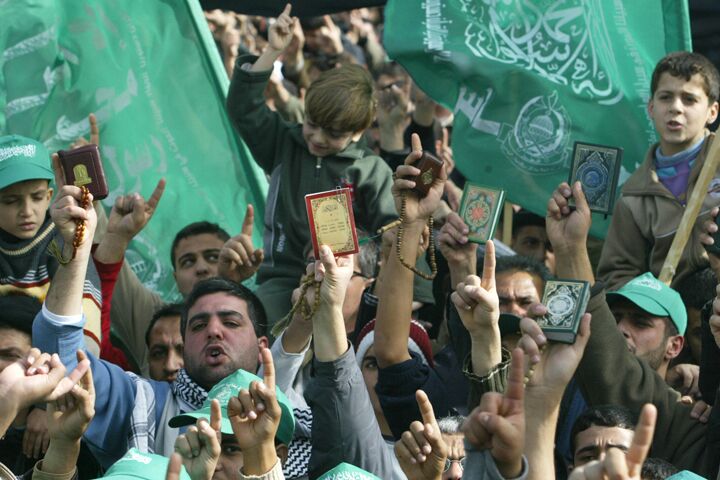
U.S. Newspapers Feature Hamas Propaganda on Op-Ed Pages
The New York Times and the Washington Post have published two op-ed articles written by prominent Hamas member Ahmed Yousef. The Los Angeles Times has also published an op-ed by the organization’s political bureau deputy, Mousa Abu Marzook. The Yousef by-lines appeared in the June 20 New York Times and Washington Post, and the Marzook article appeared in July.
Hamas is a known terrorist organization.
In “What Hamas Wants,” Yousef claims that Hamas’s violent takeover of the Gaza Strip should not be referred to as a “coup,” insisting that Hamas did everything it could to try to work out a peaceful power-sharing arrangement with its political rival within the Palestinian Authority, Fatah.
“From the day Hamas won the general election in 2006 it offered Fatah the chance of joining forces and forming a unity government,” Yousef wrote. “It [also] tried to engage the international community to explain its platform for peace.” Problem is, the international community had a problem with Hamas’s official platform, which for one refuses to accept Israel’s right to exist.
It was Hamas’s unwillingness to compromise on its hardcore anti-Israel doctrine that was the reason financial aid to the joint Hamas-Fatah unity government was revoked by the United States and the European Union. But Yousef failed to discuss the withdrawal of funding and the reason behind it in his editorial, instead implying that his organization made a sincere effort to work with Fatah and the international community. “Hamas even adhered to a unilateral cease-fire for 18 months in an effort to normalize the situation on the ground,” he wrote.
“For 18 months we have tried to find ways to coexist with Fatah, entering into a unity government, even conceding key positions in the cabinet to their and international demands, negotiating up until the last moment to try to provide security for all our people on the streets of Gaza.
“None of these points appear to have been recognized in the press coverage of the last few days,” Yousef whined. Yousef was referring to coverage around the time Hamas, possibly at the signal of Iran, broke out into full-scale warfare against Fatah in June, shooting security guards, setting off bombs, throwing some captured Fatah supporters off rooftops and executing others in the streets, sometimes in front of their wives and children.
In his “Engage With Hamas” editorial, Yousef refers to his organization’s bloody actions in Gaza as securing the area and blames problems in the area on “the Israeli agenda of ethnic cleansing and conquest.” The leader also insisted that Palestinians want the same things Western citizens want and denies that Hamas-controlled Gaza could be a breeding ground for terrorism.
Throughout the piece, Yousef was careful not to draw attention to his group’s stance against Israel’s existence, which is clearly outlined in the Hamas charter.
The op-eds are not the first or most outlandish instance of the American press granting preferential treatment to terrorists. The Times published another Yousef op-ed in November 2006, and the Washington Post and Newsweek together publish a featured column by cleric Muhammad Hussein Fadlallah, whom the U.S. government has accused of issuing a religious edict condoning the truck bombing of U.S. Marine headquarters in Beirut in 1983.
In his July 24 “On Faith” column, Fadlallah, who has had close ties with Hezbollah in the past, asserts that jihad is always either “defensive” or “preventative,” and never aggressive. “In the light of this, jihad is no different than any human and civilized concept of self-defense,” he writes. For a look at whether or not Islam is a peaceful religion, read “Is Islam a Threat?”
Newsweek interviewed Fadlallah in 2003 and 2004, publishing his support of Iraqi terrorist leader Moqtada al-Sadr’s form of violence and his view that President Bush “regards himself as the Second Coming of Christ” and that “we should send him to a psychiatrist.” Fadlallah also refers to suicide bombings as “martyrdom operations” and implies that Israel uses F-16s and rockets to intentionally kill innocent civilians. More importantly, editors chose to describe Fadlallah in a favorable light and posted his comments unchallenged and undebated.
Other editors have gone so far as to write in support of terrorists, such as former Chicago Tribune public editor Don Wycliff and the Boston Globe’s editorial board, who claimed Israel was largely to blame for the Palestinian civil war in Gaza. For more on the mainstream media’s unobjective and even irrational treatment of violent extremist causes, read “Manipulating the Media” and “The Terrorists’ Megaphone.”
